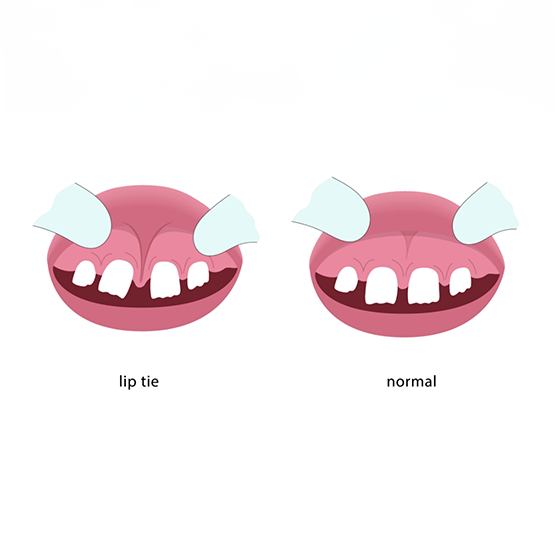Lip Tie Treatment Boulder
Treating Lip Ties and Preventing Long-Term Problems
A lip tie might not seem like an obvious issue, but believe it or not, this condition can lead to many more problems if left untreated. Often, it can interfere with breastfeeding, cause impaired speech development, and contribute to mouth breathing. We can help anyone – no matter their age – who is struggling with the negative impact of an untreated lip tie. If you or a loved one has a lip tie, feel free to contact our team at Rocky Mountain Tongue Tie online or by phone to learn more about our possible options for lip tie treatment in Boulder.
Why Choose Rocky Mountain Tongue Tie for Lip Tie Treatment?
- Dr. Jesse is a Board-Certified Pediatric Dentist with 3+ Decades of Experience
- Dr. Jesse Has Performed Thousands of Releases Since 2012
- Educational Approach Designed to Empower Patients
What Is a Lip Tie?

A lip tie is a condition involving the band of tissue that connects your lips to your gums. This piece of tissue is called the frenulum, and normally, it’s responsible for keeping the lips stable. However, if the frenulum is too short, too tight, or otherwise restricted, it can stop the lips from moving the way they should. This restriction can lead to all sorts of consequences, including but not limited to, failure to nurse properly, orthodontic crowding surrounding the tie, inability to close the gap between the front two teeth, tooth decay, and speech issues.
What Are the Signs of a Lip Tie?

Typically, infants with lip ties have trouble latching during breastfeeding, often indicated by a shallow latch, popping on and off the breast, and tucking the lip under when trying to nurse. They may also experience excessive gassiness, reflux, and even colic, because the lip tie is preventing them from forming a good seal around the mom’s breast. It’s also possible for breastfeeding mothers to experience discomfort during feeding sessions because the tie causes the baby to slip down, off of the nipple, and “chomp” rather than seal and suck.
In older children and adults, lip ties can result in front teeth that are spaced far apart, as well as possible gum recession and an open mouth posture. If you believe you or someone in your family has a lip tie, you should schedule a consultation with our team so that we can begin drawing up a custom treatment plan.
Why Is It Important to Treat a Lip Tie?

If you or another loved one has a lip tie, ignoring the problem could lead to consequences down the road, especially if it’s preventing your infant from breastfeeding or your young child from learning how to properly speak. What’s worse is that the problem can even render them more vulnerable to cavities and decay. Having a lip tie treated can significantly improve one’s dental health and overall wellness in several ways, which is why it’s best to take action and have the problem addressed by our lip tie team here in Boulder!
Lip-Tie FAQs
How Should I Prepare for a Frenectomy?
Because frenectomies are quick and minimally invasive, you won’t have to do much prep work for the treatment itself. If you’re bringing your infant in for treatment, we recommend feeding them or giving them a snack one to two hours before your appointment. This can help them feel more at ease and reduce fussiness but also give them time to be hungry enough to feed after their treatment. With their lip-tie released, they should be able to enjoy a smoother feeding experience!
Does a Frenectomy Hurt?
No – patients both big and small report feeling little to no pain. Our high-tech laser ensures the process is quite comfortable, and also cauterizes the treatment area, significantly reducing the amount of bleeding you can expect.
Young infants can become startled – after all, this type of experience isn’t normally part of their day, and they don’t understand what’s going on. Rest assured, we’ll be as gentle as possible with your little one. As a board-certified pediatric dentist, Dr. Witkoff has specialty training in providing comfortable, safe treatment for children of all ages.
How Long Does a Frenectomy Take?
We can often release lip-ties in a matter of minutes! If you or your child needs more than one lip-tie removed, or if the tissue is especially thick, then treatment might take a little longer. In general, though, the process is quick and efficient.
When you visit our office for a consultation, we’ll be sure to give you a more precise estimate of how long the frenectomy will take. We understand that many of our patients have busy schedules, and that being able to plan accordingly is important!
How Will You Keep My Baby Still for the Frenectomy?
This is an excellent question. Our team wants to make sure your baby is as comfortable as possible during their frenectomy, but at the same time, it’s important to keep them still. We typically swaddle infants snugly. This is more comfortable for them and allows our team to treat their lip-tie with care and precision.
Can Adults Have Lip or Tongue-Ties?
Absolutely. The symptoms tend to look a little different, but sometimes lip-ties go undetected until adulthood. Since frenulum don’t thin or go away on their own, adults with lip-ties might experience neck and shoulder tension, headaches, sleep apnea, trouble swallowing pills, or difficulties with speech. If you believe you might have a lip-tie as an adult, we’d be happy to provide treatment!

